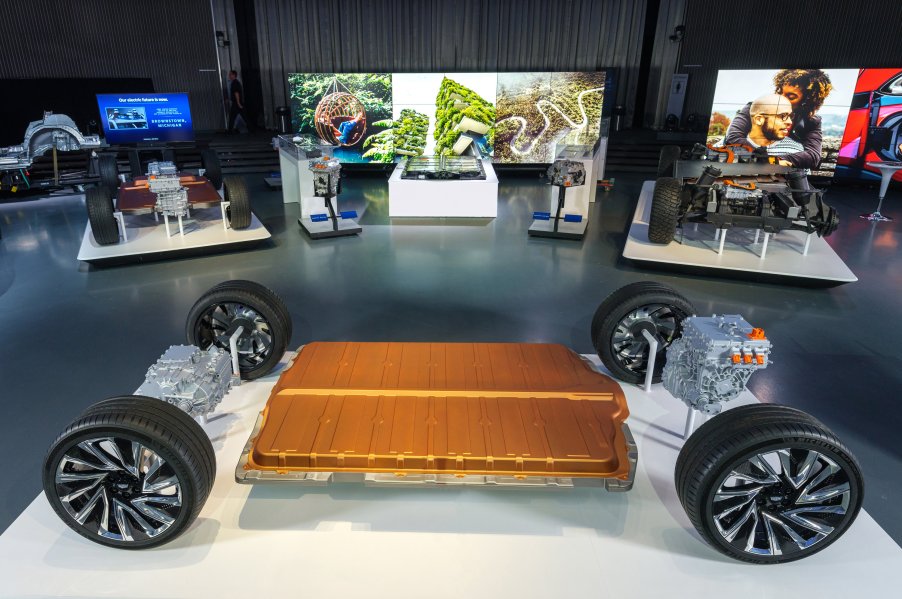
Will EV Batteries Truly Become Affordable in 2023?
While the global internal-combustion vehicle fleet is slowly pivoting to EVs, it won’t be a simple or quick process. And most of the barriers are based on what separates ICE vehicles from EVs: battery packs. However, in addition to updates in design and material choices, there may be more good news for potential EV owners on the horizon. A new report predicts that we could see a significant drop in battery prices as soon as 2023.
EV battery costs may drop below $100/kWh after 2023
One of the costliest components of an EV is its battery pack. The owner of a used 2013 Nissan Leaf was quoted $15,000 for a new one. And this isn’t just a problem for used electric cars, either.

Battery packs are more expensive to produce than ICE engines, and these costs are passed down to the consumer. And that price difference remains one of the biggest barriers to EV ownership, InsideEVs and Bloomberg report. Plus, as automakers start making more EVs, the federal tax credits start to shrink. But the cost barrier might not be up for long.
In 2019, the average price of an electric car battery hovered at $120/kWh, Reuters reports. That’s an impressive achievement, given that in 2014, the price was $280/kWh. However, according to energy research firm BloombergNEF, it’s possible the price may drop to $101/kWh in 2023, Car and Driver reports. And after 2024, it may be down below $100/kWh, Automotive News reports.
What’s driving the price drop? It’s partially due to different battery chemistries that eliminate or reduce the use of expensive (and problematic) materials like cobalt, Road & Track reports. Manufacturers like Toyota are also working on new kinds of electric car batteries, such as solid-state ones, which have lower-cost designs. Plus, as EV production and sales grow, costs drop, just as with ICE cars, BNEF explains.
Why is the $100/kWh mark important, and can we actually hit it?
The extra manufacturing costs associated with building an EV versus an ICE car can be curtailed in a variety of ways, Autoblog reports. But one of the most significant is by making electric car battery packs cheaper. That’s because, although the average EV can now go 120-200 miles on a charge, some consumers still have range anxiety. That means larger packs and higher costs.
That $100/kWh cost is often considered the turning point for affordable EV ownership, Reuters explains. Once batteries become that cheap or cheaper to make, EV prices will start being virtually identical to ICE vehicle prices. And if there are any tax credits left, EVs maybe even cheaper than their ICE counterparts, Car and Driver reports.
But is it actually possible for EV batteries to reach the $100/kWh mark by the end of 2023? Technically, some already have. BNEF reports that a few Chinese electric buses have packs that cost $100/kWh, though the average price is $105/kWh. Nevertheless, even if raw material prices go up, the report claims that this shouldn’t cause significant delays.
What happens after that, though, is more unclear. BNEF reports that EV batteries could be as cheap as $58/kWh by the end of 2030. But because the report claims there are “several options and paths that could be taken,” this prediction is a bit more nebulous.
What challenges do electric car batteries still face?
Making EVs more affordable by lower battery prices is an excellent first step in increasing adoption rates. However, it’s still only one step.

The reason why range anxiety is still an issue is that in many communities, convenient charging locations aren’t available. And while charging at home is a work-around, not everyone has a dedicated space for a home charger. That’s especially true for people living in apartment complexes. Plus, even with a fast charger, recharging an EV still takes longer than refueling a gasoline-powered car. A bigger, cheaper, battery is great, but if you can’t recharge it easily, what’s the point?
There’s also the issue of what to do with electric car batteries once their life-cycle is over. Recycling a lithium-ion pack is possible, but it’s more expensive than recycling a conventional lead-acid battery. But, if lowering costs and reducing environmental impact is the goal, more-efficient recycling could drop pack prices even more.
Follow more updates from MotorBiscuit on our Facebook page.


